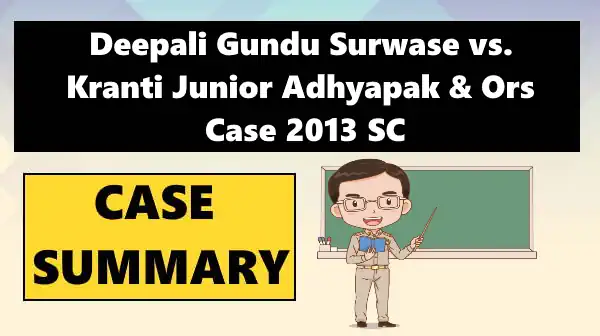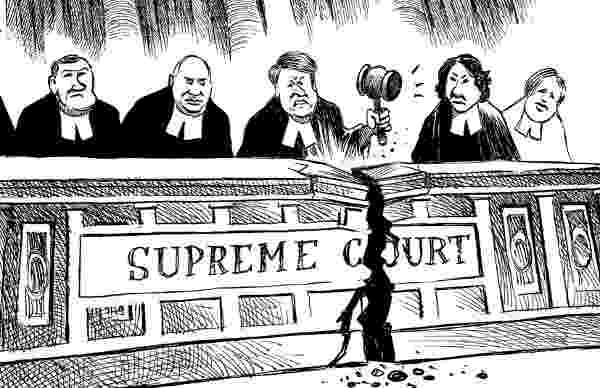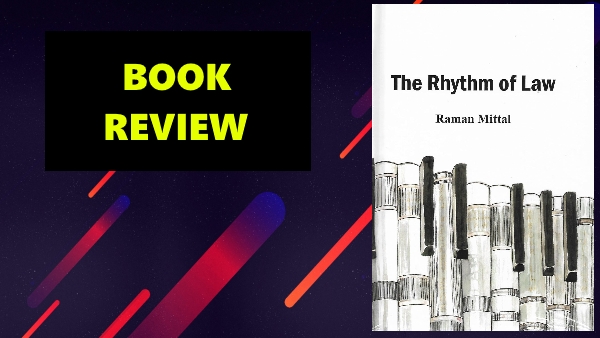Deepali Gundu Surwase vs. Kranti Junior Adhyapak dealt with the issue that if the appellant is eligible for back wages for the period where she was unreasonably suspended from her services. Various precedents and provisions under the Maharashtra Employees of Private Schools (Condition of Service) Regulation and the Industrial Dispute Act are considered to prove the above-stated issue.
BENCH: Justice G.S. Singhvi, Justice V. Gopala Gowda
DEEPALI GUNDU SURWASE JUDGEMENT DATE: August 12th, 2013
DEEPALI GUNDU SURWASE CASE CITATION: (2013) 10 SCC 324
DEEPALI GUNDU SURWASE CASE FACTS:
- The appellant was a teacher in Nandanvan Vidya Mandir (Primary School) which was run by a trust and established and controlled by bagade family. The aid granted by the State Government includes building rent received by bagade family as it belongs to one of its members.
- The Municipal Corporation raised a tax bill amounting to Rs. 79,974 by considering the property as commercial property. Then the school’s headteacher, who was also the president of the trust, addressed all the employees, along with the appellant, to contribute a sum of Rs. 1500 monthly as the tax liability.
- The appellant did not comply with the directions of the headteacher. Then the management issued 25 memos to the appellant and suspended her for the refusal. Then all the allegations were denied by her in the memos to which she replied.
- The education officer did not approve for appellant’s suspension but then also her suspension was not canceled by the management and was not paid nominal allowances under Section 16 of Maharashtra Employees of Private Schools (Condition of Service) regulation act, 1977.
- Then the appellant filed a writ petition in the division bench of the High Court. The court held that from 14th March 2007, the appellant must be reinstated and she is also liable for the benefits stated in Rule 37(2)(f)of the regulation act, 1977.
- On 28th December 2006, the management was holding an inquiry against the appellant under Rules 36 and 37 of the rules. Smt. Sulbha was nominated by the appellant to appear before the inquiry committee, but was not allowed to take part in the inquiry. An ex parte proceeding was held and as a result, it terminated her services.
- On 25th June 2007, the appellant filed an appeal in the School Tribunal by stating that the management violated the principle of natural justice and further stated that the management’s aim was to teach her a lesson for her denial to pay the tax liability.
- The tribunal, by referring to the memos, stated that a revengeful motive of the headmistress is involved towards the appellant and allowed the appeal and set aside the termination of services with full back wages to the appellant.
- The management filed a writ petition to the single judge of the High Court. It was held that the decision of the tribunal was partially correct and the termination of her services violates the principle of natural justice. It further set aside the order of the payment of back wages, as there was no application by the appellant that she was not gainfully employed from the suspension to the reinstatement.
- Then the appeal was filed in the Supreme Court.
ISSUES:
Whether the appellant is eligible for the back wages or not for the period of suspension under the Industrial Dispute Act, 1947?
CONTENTIONS:
DEEPALI GUNDU SURWASE CONTENTIONS (APPELLANT):
- The appellant by referring to the judgments of the case in Hindustan Tin Works Private Ltd. vs Employees of Hindustan Tin Works Private Ltd, Surendra Kumar Verma vs Central Government Industrial Tribunal- cum Labour Court, etc contended that the order of the High Court in setting aside the payment of back wages is erroneous.
- He also stated that the order of the tribunal was under the act and rules. He also stated that in view of the restriction in Rule 33(3), the appellant was not in the other employment and is entitled to back wages for the period of suspension.
KRANTI JUNIOR ADHYAPAK CONTENTIONS (RESPONDENT):
The respondent contended that the High Court’s order is correct for setting aside the order of the tribunal in case of payment of back wages as the appellant did not submit any evidence for proving that she was not employed during the suspension period which is important for the entitlement of back wages as referred in the cases of M.P State Electricity Board vs Jarina Bee, Kendra Vidyalaya Sangathan vs S.C. Sharma, etc.
RATIO DECEDENDI:
- Justice G.S. Singhvi, Justice V. Gopala Gowda: The Bench stated that the illegal termination of the employees is injurious to both the employee and her family, leading to the loss of a source of her survival. This punishes the employees and rewards the employees by relieving them of the payment of back wages.
- The Bench, by referring to the precedents, stated that in case of illegal termination, reinstatement will back wages is the mandatory rule.
- They further stated that the factors to be considered for back wages are the length of service of the employee, misconduct if any against the employee and any other factors which are relevant.
- They also stated that she is entitled to back wages as she is prohibited from being employed elsewhere according to Rule 33 and the single judge was wrong in overlooking the decision of the division bench of the High Court.
DECISION:
- The court allowed the appeal and stated that the single judge of the High Court was not correct in interfering with the decision of the order passed by the tribunal and the inquiry held against the appellant was against the principle of natural justice.
- It further stated that the order of the tribunal is restored and the appellant is liable for the full-back wages within four months from the order and if the management does not comply, then it will be liable to pay @ 9% interest per annum from the suspension till the reinstatement of the appellant and will also be liable for punishment under the Contempt of Court’s Act, 1971.
CONCLUSION:
The conclusion that we can draw from this case is that the illegal termination will lead to the loss of survival for the employee and his family. It also states that in case of illegal termination, the higher courts should not interfere with the decision of the lower courts, and accordingly, the employee will be liable for the back wages.
Found Deepali Gundu Surwase vs Kranti Junior Adhyapak Case summary useful? We have a bunch of useful topics from labour law that will help you in your preparation here >>> LABOUR LAW
Check out our YouTube Channel for free legal videos >>> LAW PLANET YT





